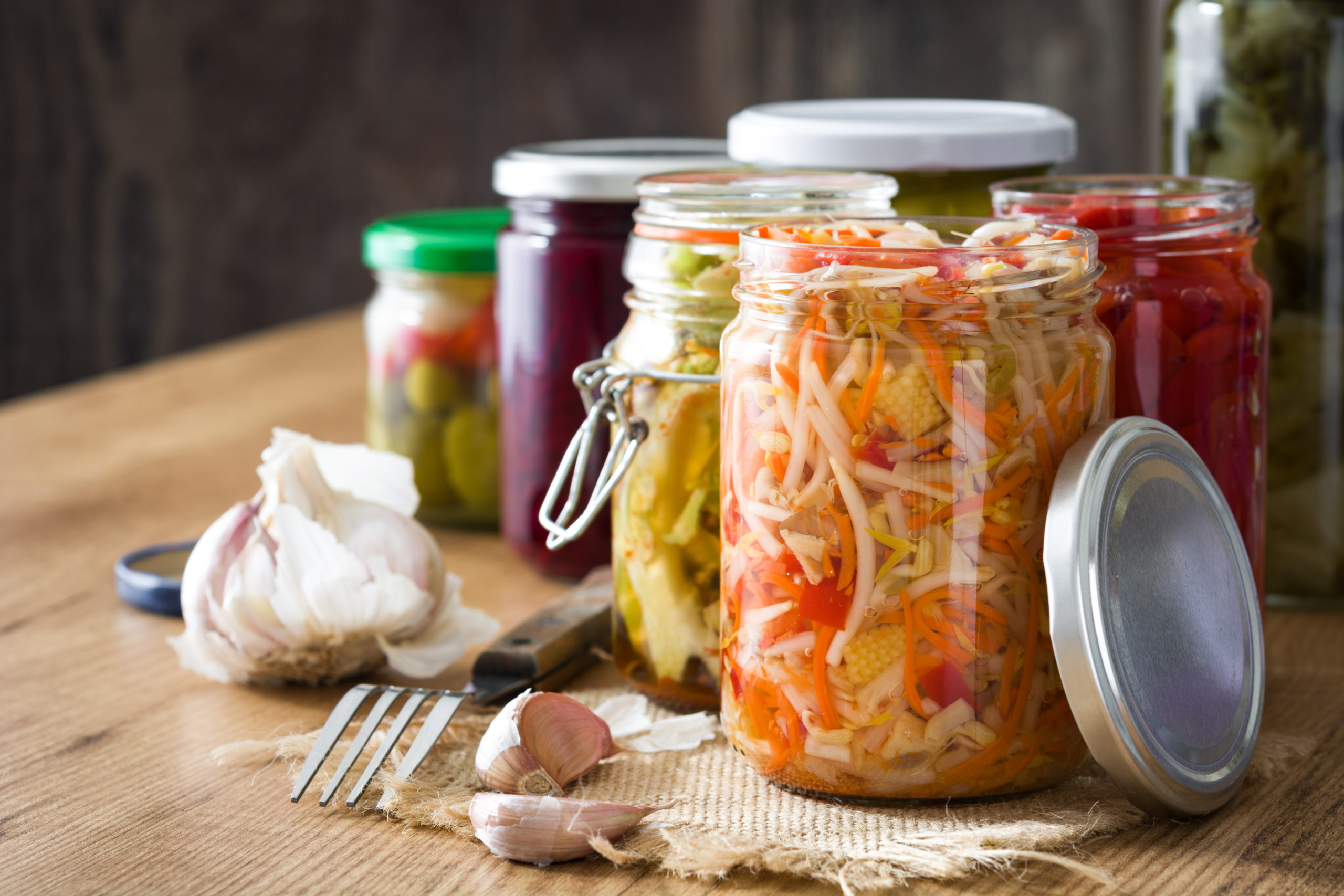As a nutrition expert, you’d think that I would embrace fermented foods with open arms. In fact, it took me a while to get used to the idea. It started with a whole lot of, “Ick!” but I’m a total convert these days.
When you hear about fermented foods, you might think of yogurt. (More on that in a minute.) But there’s a long list of foods and beverages beyond yogurt that provide all the fabulous benefits of fermentation.
These fermented foods have seemingly endless health benefits and can be a budget-friendly, flavor-packed, and an incredibly simple way to give your overall health a big boost.
If you’re new to the world of fermentation, here are five things you should know:
1. Fermented foods contain probiotics
Foods are fermented using bacteria, mold, or yeast (so are cheese and beer, but unfortunately, I’m not talking about those!). The natural bacteria on the vegetables or other foods take over and eat up glucose, producing lactic acid.
That lactic acid protects the food and won’t allow pathogens like foodborne illnesses to grow. This is a practice that humans have been doing for thousands of years to both preserve the food and make it more digestible.
That digestion piece is really key. Fermentation makes nutrients more bioavailable, meaning your body can better absorb them.1 You get more bang for your buck this way.
Plus, those probiotics build microbial diversity in your gut. That means a leaner body, a stronger immune system (because 70% of the immune system lives in the gut2), fewer allergies, better mental health, fewer instances of inflammatory bowel diseases and autoimmune disorders, and so much more.
Learn more about why the gut is the seat of health in this Medium article.
2. There are a variety of fermented foods to choose from
You’re likely to find lots of different fermented foods at the grocery store, but not all are created equal. The best options are fermented vegetables—sauerkraut, kimchi, and other “pickled” vegetables like cucumbers, beets, onions, asparagus. and more. You can pickle just about anything!
The ones you'll want to avoid are soy-based fermented foods like tempeh and tofu (read why there’s no joy in soy in this article). Kombucha has also been the darling of the wellness world as a fermented solution to all your problems, but the bottles you’ll find in stores are always filled with sugar, which really defeats the purpose. If you're hoping to sip on a gut-friendly beverage, you can try making water or coconut kefir, or look for a low-sugar probiotic sparkling drink.
Speaking of kefir (which is typically made with milk) you may have heard about its benefits for gut health, along with yogurt. While they do both contain probiotics, dairy is a highly reactive food that can cause inflammation, digestive upset, and other issues. Many commercially available yogurts also contain added sugars and other nasty ingredients. Plus, those probiotics are typically added to the yogurt after it’s made in commercial products, and only a couple of strains at that.
Among traditional yogurts, you’ll find plant-based options including almond-milk yogurt. Many are cultured in the same way as traditional yogurts, meaning they have live active cultures or probiotics. But read your labels and find one with few ingredients and no or low added sugar.
Ideally, you’ll want a fermented food that has five to 15 different strains of bacteria to seed the gut microbiome with good diversity. Here's a handy list of things to look for at the store:
- Sauerkraut
- Kimchi
- Dill pickles (lacto-fermented, not vinegar-brined pickles)
- Pickled cauliflower, carrots, asparagus, beets, onions, or other vegetabless
- Yogurt made from almonds, cashews, coconut, or other dairy alternative
- Fermented cheese made from almonds, cashews, macadamia or other type of nut
- Miso (made from chickpeas or other soy alternative, if you can tolerate legumes)
- Water kefir
- Coconut kefir
- Low-sugar probiotic sparkling drink (like Kevita)
3. Fermented foods are really easy to DIY
Venturing into DIY fermentation may feel a little bit scary. There’s potential for harmful bacteria to grow, and in your experiments, you will definitely have to throw out a batch or two when mold appears. It takes a little time to learn how it’s done, but once you get the hang of it, fermenting your own vegetables is a breeze.
All you really need is your vegetables, some salt or brine, and a mason jar. And do make sure everything you’re using (including your hands) is super clean to avoid introducing the wrong kinds of bacteria into the mix.
Watch me make sauerkraut with my friend Donna Gates below. You’ll see just how easy it is to put together. The hardest part is waiting for it to be ready!
Of course, it’s always nice to have a quick and convenient option too. If you don’t want to DIY, look for products that are refrigerated and unpasteurized. Pasteurization kills off the bacteria that you want from fermented food, so you won’t get the gut health benefits you’re looking for. Even if it is refrigerated, that product still might be pasteurized (it’s all about clever marketing), so be sure it says it on the label.
Checking out your local farmers' market is a great option, too, since lots of local growers make pickles, sauerkraut, and more from their crops.
4. Fermented foods may not be for everyone… right now
While probiotic-rich fermented foods are an accessible and simple way to support your health, there are a few very important instances in which you’ll want to avoid them.
- If you have small intestinal bacterial overgrowth (SIBO). SIBO means that bacteria is growing in places that it shouldn’t, so you don’t want to introduce any more bacteria to the issue. Yes, even the good guys in the wrong place can spell trouble. Read more about SIBO here.
- If you have yeast overgrowth or candida. Similar to SIBO, candida means natural yeast has traveled to parts of the body where it shouldn’t be. To use one example, kombucha would add to the problem because it contains yeast that will fuel the fire. Luckily, fermented veggies are still safe here since they don’t contain yeast and are fermented in an anaerobic environment.
- If you have histamine intolerance. Histamines naturally occur in food, especially fermented foods. Some people are not able to digest these well. Learn more about histamine intolerance in this blog.
Of course, these are all signs that your gut health needs to be addressed stat. Once you have these issues in check, however, you should be able to enjoy fermented foods as a healthy and supportive part of your diet.
Also, I recommend starting small, around 1/4 cup, to allow your body to get used to the probiotic load. You can increase your intake as your body adjusts.
5. Fermented foods can help tame your sweet tooth
The lactic acid in your fermented veggies is what makes them have a sour taste. Hear me out—eating sour foods can actually curb your sugar cravings! Just try it out and have a spoonful of sauerkraut the next time you’re jonesing for a cupcake.
What’s more, the bacteria in your gut actually craves sugar, but sugar can create a whole host of digestive issues.
You can also use apple cider vinegar to serve the same purpose. Make sure you’re buying a refrigerated version with the “mother”. The “mother” refers to the cloudy yeast and bacteria you’ll see inside the glass bottle, rather than the clear liquid of refined versions. This is true fermented vinegar and you can dilute it with some water and take a swig to help curb your sweet tooth.
Create more harmony in your microbiome
Fermented foods can be an amazing source of vitamins, minerals, and probiotics to support everything from your gut health to your skin, mental health, immune system, and more.
If fermented foods just aren’t your taste, you’re not big on DIY, or you simply need an additional source of convenient probiotics, you will want to look into a high-quality probiotic supplement.
No matter what your personal goals are, the end destination is always the same: I want you to feel better than you ever have. That’s why it’s so important to have a roadmap you can trust. Let’s break down your journey into small, manageable steps that make scientific sense in my Ultimate Health Roadmap. Download it for FREE here.
References:
- Samtiya, Mrinal & Aluko, Rotimi & Puniya, Anil & Dhewa, Tejpal. (2021). Enhancing Micronutrients Bioavailability through Fermentation of Plant-Based Foods: A Concise Review. Fermentation. 7. 63. 10.3390/fermentation7020063.
- Wiertsema SP, van Bergenhenegouwen J, Garssen J, Knippels LMJ. The Interplay between the Gut Microbiome and the Immune System in the Context of Infectious Diseases throughout Life and the Role of Nutrition in Optimizing Treatment Strategies. Nutrients. 2021;13(3):886. Published 2021 Mar 9. doi:10.3390/nu13030886






